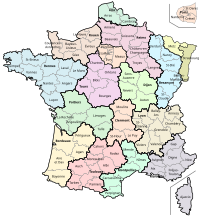Bishop of Besançon
|
Archdiocese of Besançon Archidioecesis Bisuntinus Archidiocèse de Besançon |
|
|---|---|

|
|

Coat of arms
|
|
| Location | |
| Country | |
| Ecclesiastical province | Besançon |
| Statistics | |
| Area | 9,732 km2 (3,758 sq mi) |
| Population - Total - Catholics |
(as of 2015) 608,500 578,400 (95.1%) |
| Parishes | 67 |
| Information | |
| Denomination | Roman Catholic |
| Sui iuris church | Latin Church |
| Rite | Roman Rite |
| Established | 4th Century |
| Cathedral | Cathedral of St. John |
| Patron saint | Immaculate Conception |
| Current leadership | |
| Pope | Francis |
| Metropolitan Archbishop | Jean-Luc Bouilleret |
| Emeritus Bishops | André Jean René Lacrampe Archbishop Emeritus (2003-2013) |
| Map | |
 |
|
| Website | |
| Website of the Archdiocese | |
The Roman Catholic Archdiocese of Besançon (Latin: Archidioecesis Bisuntinus; French: Archidiocèse de Besançon) is a Latin Rite Roman Catholic ecclesiastical territory in France. It comprises the département of Doubs (except for Montbéliard) and the département of Haute-Saône, except for the canton of Héricourt.
The see is currently sede vacante.
From 1034 the archbishop had civil authority within the Holy Roman Empire as the prince-archbishop of Besançon. He gradually lost his civil power to the town council; the city became the Imperial city of Besançon in 1184. The city was annexed by France in stages, eventually being fully subsumed in 1792 by it during the French Revolution.
Local tradition states that the diocese was evangelized by Saints Ferreolus and Ferrutio (Ferréol and Ferjeux), who were sent here by St. Irenaeus, Bishop of Lyon. According to the Catholic Encyclopedia, "Louis Duchesne proved that these legends belong to a chain of narratives forged in the first half of the 6th century and of which the "passion" of St. Benignus of Dijon was the initial link."
During the Middle Ages several popes visited Besançon, among them pope Leo IX who consecrated the altar of the old Cathedral of St. Etienne in 1050, and Eugenius III, who in 1148 consecrated the church of St. Jean, the new cathedral. A council was held at Besançon in 1162, presided over by Holy Roman Emperor Frederick Barbarossa, in the interest of the Antipope Victor IV against Pope Alexander III. Guido of Burgundy who was pope from 1119 to 1123 under the name of Calixtus II, and the Jesuit Claude-Adrien Nonnotte (1711–1793), an adversary of Voltaire, were natives of Besançon.
...
Wikipedia
